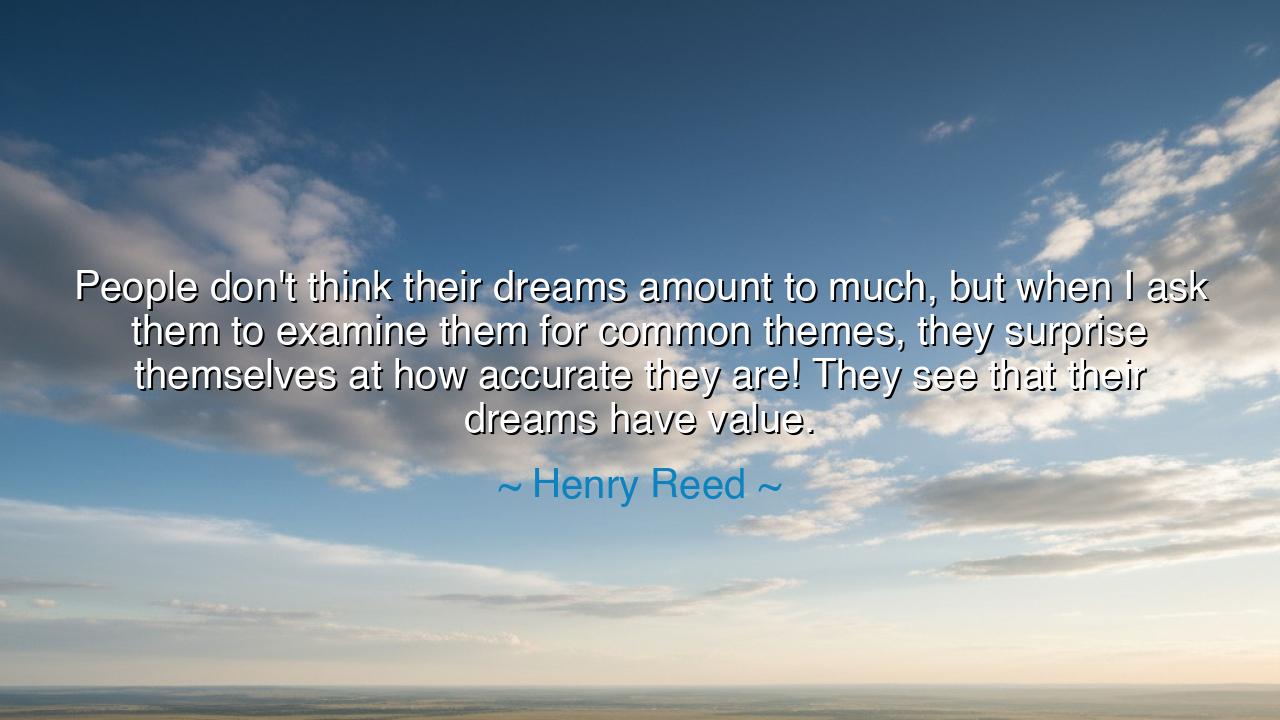
People don't think their dreams amount to much, but when I ask
People don't think their dreams amount to much, but when I ask them to examine them for common themes, they surprise themselves at how accurate they are! They see that their dreams have value.






“People don’t think their dreams amount to much, but when I ask them to examine them for common themes, they surprise themselves at how accurate they are! They see that their dreams have value.” – Henry Reed
Hear, O wanderer of the inner realms, the wise and gentle words of Henry Reed, a scholar of the mind and of the spirit, who devoted his life to uncovering the hidden messages that lie within the mystery of dreams. His words remind us that what we often dismiss as fleeting illusions of the night may, in truth, be reflections of our deepest wisdom. When he says, “People don’t think their dreams amount to much,” he speaks of the common neglect we show toward the secret language of the soul. We treat our dreams as shadows—strange, shifting, without meaning—yet they are in fact the whispers of our own higher selves, trying to be heard above the noise of waking life.
Henry Reed, a psychologist and teacher inspired by the work of the mystic Edgar Cayce, believed that dreams are bridges between the conscious and the divine. In the stillness of sleep, when the mind loosens its grip on logic and routine, the deeper truths of the spirit rise to the surface. Reed taught that by paying attention to our dreams, by seeking themes and patterns within them, we uncover a mirror of the soul’s desires, fears, and purposes. For though the dream may appear strange—filled with symbols and impossible images—it is, like all myths, a story woven in code, carrying messages from the realm of truth that our waking mind too often ignores.
The ancients, too, understood this sacred dialogue between sleep and spirit. In the temples of Asclepius, the Greek god of healing, those who sought health or wisdom would sleep within the sanctuary, hoping for a dream that would reveal their cure or guide their path. The Egyptians kept careful records of their nightly visions, believing them to be the speech of the gods. Even the prophets of Israel received revelation through dreams—Jacob’s ladder reaching heaven, Joseph’s foresight of famine, Daniel’s interpretation of kings’ visions. Throughout history, humanity has known that dreams have value—not because they predict the future, but because they reveal the truths that already dwell within us.
When Reed says that people “surprise themselves at how accurate they are,” he speaks of that sacred recognition that comes when a person begins to see meaning in their dreams. Suddenly, the fragments align—the recurring image of water becomes the symbol of emotion, the locked door becomes the fear of limitation, the unending journey becomes the longing for growth. In discovering these patterns, the dreamer discovers themselves. For the dream does not lie; it speaks in the language of metaphor, revealing through symbol what the waking mind dares not face. Thus, when a person looks within and listens, they realize that their unconscious has been their most faithful companion, guiding them toward healing, understanding, and renewal.
There is a story told of Jung, the great depth psychologist, who once treated a woman troubled by anxiety and sorrow. Night after night, she dreamed of a neglected garden overrun with weeds. As she began to reflect upon her dream, she realized that the garden was her own soul—her creative life, long abandoned to the demands of duty and fear. When she began to paint again, to write, to live with joy, the garden in her dreams began to bloom. This is the truth Reed knew: that our dreams reveal what is missing, what is broken, what must be tended within us. They are not mere phantoms; they are maps to wholeness.
And yet, too often, the modern mind dismisses such revelations. We awaken from a vivid dream, only to brush it aside as nonsense, as chemical chance, as nothing of consequence. But Reed urges us to pause, to listen, to examine them for common themes. In doing so, we recover the lost art of self-communion. For the dreaming mind is like an ancient oracle—its wisdom obscured not because it is silent, but because we have forgotten how to hear. To honor one’s dreams is to honor one’s own depths—to acknowledge that within us lies a wisdom far older and wiser than the intellect alone.
So, my child of the night and of the dawn, take this teaching as your guide: do not dismiss your dreams. Keep a record of them. Reflect upon them as you would upon sacred scripture. Seek the patterns, the common themes, the repeated symbols that rise again and again—they are the compass points of your soul. In them, you will find your fears laid bare, your desires made visible, your purpose made known. Do not be afraid of what you see, for truth, once seen, becomes light.
Henry Reed’s words remind us that the journey of self-discovery begins not in the noise of the world, but in the quiet of our own inner night. To dream is to speak with eternity; to understand one’s dreams is to remember who we are. And when we at last awaken to that truth, we will see that the world itself is but another kind of dream—one that we are meant to shape, to tend, and to fill with meaning, until our waking life, too, becomes the garden of our deepest visions.






AAdministratorAdministrator
Welcome, honored guests. Please leave a comment, we will respond soon